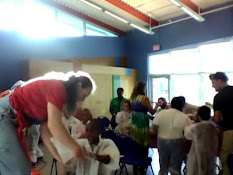I am doing what I Love! Isn't that what we all want? How silly of me not to have been an English Major to begin with. That's OK. I learned some great technical and real world applications along the way.
This semester I have two Literature courses. I chose American Literature, well, because I'm American. And WOW! how the texts have changed since I was in school and first read our Nation's History. I am very much pleased that we begin our readings with the Native Americans instead of Christopher Columbus. I am so looking forward to future readings, that I 'thought' I knew, because now I will read them through the eyes of experience.
Can I Hear Your Story?
Before I was of reading age, Oma, Granny in German, would read me German Fairytales in German from Das Goldene Mårchenbuch. Her contralto voice accented by varying tones and punctuated inflections gave each line of the story depth and dimension. No longer were these mere words spoken from a book. The story had now evolved to theatre and seeded well in my young and fertile imagination.
The authors of our Bedford Anthology text are quick to point out that the Native American Myths and Creation stories in this collection do not fare well when translated to English and imprisoned in the written word. “Words, spoken words, were the manifestations of their [The Kiowas] deepest belief, of their deepest feelings, of their deepest life” (58). Just as Oma had made ominous Hansel and Gretel’s witch by the lowering of her tone, so too does the Native American storyteller use his or her tones, dramatic pauses and accompanying sound effects to embellish the story.
But these are not mere embellishments; the ‘sound effects’, if you will, are part of the story. And I feel cheated. I want to hear the sounds and pauses, inflections and intonations and marvel at the wildlife mimicry. I want to see the expression on the storyteller’s face as he or she relays the drama through wise eyes and a deeply lined, tanned and weathered face. I want most of all to feel the emotions sent to me via human voice and have its timbre shudder my soul.
I became very lost and much confused with the reading of A Tale of the Foundation of the Great Island, Now North America ~ The Two Infants Born, and the Creation of the Universe (37-40). It seems I could get the gist of the story, but that is all. I don’t know if this is caused by the inability to understand the story as it is told to the scribe, or if it is because of the language of the years 1827, 1828. I took to heart that many of these stories vary greatly both in translation and are dependent upon the individual storyteller’s style. So, I Googled ‘Native American Turtle Story’ for a translation that maybe I could better understand.
I found the site, http://www.firstpeople.us. This has a Turtle story that I could understand a bit better, but it still was not the same story as in our text. I will have to research further in order to find a translation that I can “get” and perhaps some sound bytes as well. I noticed also, thanks to the information learned from our authors, that this story would also benefit from the telling instead of just the reading of the story.
Image Source
Image Source
In answer to this paper’s title Can I Hear Your Story, no I cannot. Nor will I ever be able to hear this or any other story that can only be imparted by the seasoned storyteller. Language is a barrier as well. Just as the Bible should be read in the original Hebrew, so should any Native American tale be told in its original Language. I do not have this capability. I find myself wondering if I should add a Native American language to my Academic repertoire, or perhaps learn it on my own.
In summation, words and the way they are imparted, either spoken or written hold not only meaning, but also meta meaning. I will attempt a critical analysis of these stories and those to come. Perhaps, by either dissection or applied and learned meanings I will gain a greater understanding of what these authors and historians were trying to tell.
Works Cited
Momaday, N. Scott. "The Becoming of the Native: Man in America Before Columbus."
Belasco, Susan and Linck Johnson. The Bedford Anthology of American Literature Volume One: Beginnings to 1865. Vol. One. Boston/New York: Bedford/St. Martin's, 2008. 58.



















